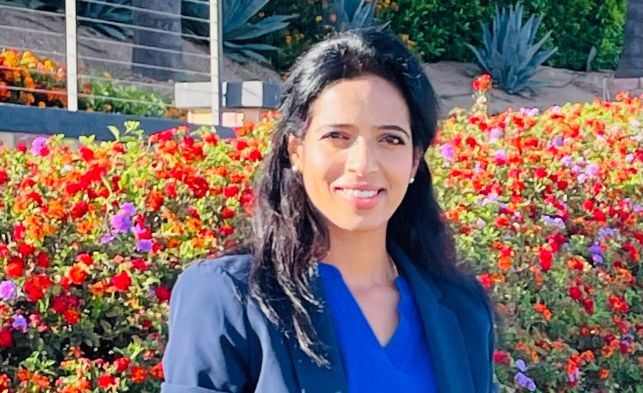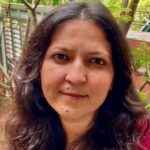Dr Sirisha Potluri is a medical doctor and dietary/lifestyle medicine coach certified in plant-based nutrition through ECornell. She got her MBBS from Guntur Medical College and did a family medicine internship at the California Medical Center. Her interest in plant-based nutrition and disease prevention is based on personal experience as she has first-hand experience of how this diet and lifestyle enhances health and well-being. She is also the author of Plant Based Los Angeles, a blog where she shares recipes and information on her projects and workshops. In conversation with Indica Yoga…
Sophia: You’re a lifestyle medicine physician, lifestyle medical coach and a plant-based chef and author. How do you integrate all these disciplines to combat chronic disease, prevention, treatment and reversal?
Sirisha: I teach my patients about the health benefits of a plant-based diet and lifestyle and I conduct group workshops where we have Q&A sessions about implementing lifestyle and diet changes for reversal of diseases. I’m honoured that you call me a plant-based chef. I believe it’s important to show, practically, how to eat healthy every day in all cuisines, so I share curated whole food plant-based recipes on our blog.
Sophia: Why did you choose the plant-based approach to nutrition and how has it affected you personally?
Sirisha: A plant-based diet is the best for our health as well as our planet. I got inspired by Dr Greger who started nutritionfacts.org. Personally, eight years ago, I lost 20 kgs and optimised my blood pressure numbers by following a plant-based diet and lifestyle. I’m still able to maintain my weight and health as there is no deprivation in a plant-based diet — it is sustainable and has become a lifestyle for me.
Sophia: What inspired you to start your blog, Plant Based Los Angeles?
Sirisha: We started this with the purpose of educating everyone about the health benefits of a plant-based diet, and also to share delicious and easy to make recipes. I also post details about my upcoming programmes and workshops on the blog.
Sophia: What are the most common myths about a plant-based diet?
Sirisha: The number one myth about a plant-based diet is that we don't get enough protein from plants. When we look at animals like elephants, cows and buffaloes, they get their protein as well as calcium from plants. Second myth is that we need to drink milk for calcium. Plants are abundant in calcium and also the calcium we get from plants is better absorbed. Iron deficiency is one more myth. We don’t need animal products for iron. We can get enough from greens, beans, whole grains, nuts and seeds. The excess iron that we get from animal products is detrimental to the heart.
Sophia: Tell us about your diabetes workshop and why the focus on diabetes?
Sirisha: The diabetes workshops I am doing right now are virtual, via zoom, it’s an hour-and-a-half every week for eight weeks with daily WhatsApp support for posting recipes and exercise activities. Why did I focus on diabetes? Type 2 diabetes has been referred to as the 21st century’s Black Death in terms of its exponential spread around the world and devastating health impacts. Type 2 diabetes, however, is almost always preventable, often treatable and sometimes even reversible through diet and lifestyle changes.
Sophia: You have used frozen food in some of your recipes. Is that healthy?
Sirisha: A vegetable in any form is better than no vegetable at all. Vegetables are packed with nutrients — vitamins, minerals, fibre and antioxidants. Freezing is a safe way to increase the shelf life of nutritious foods. However, many people incorrectly believe that frozen vegetables are much less nutritious than fresh vegetables.There are good studies comparing fresh to frozen fruit. One on strawberries and one on raspberries. They both found the same thing: “no statistically significant differences between the…[antioxidant levels] for fresh and frozen strawberries,” and “it is concluded, therefore, that freshly picked and frozen raspberries all contain similar levels of phytochemicals and antioxidants per serving.” In fact, frozen lasts longer than fresh, is available year-round and tends to be cheaper and more convenient. If you look in my freezer, it’s filled with half-frozen greens and half-frozen berries
Sophia: Your views on vegetarianism vs a plant-based diet?
Sirisha: Vegetarianism is better than eating meat, but dairy consumption increases risk of heart disease, bone fractures, diabetes and prostate cancer in men. In the population study. ‘Milk Intake and Risk of Mortality and Fractures in Women and Men,’ researchers following more than 100,000 men and women in Sweden for about 20 years found significantly higher rates of bone and hip fractures, heart disease, cancer and premature death for women who drank more milk. Three glasses a day was associated with nearly twice the risk of dying early. Men with higher milk consumption were also recorded having a higher risk of premature death.
Studies have shown plant-based eating can improve not only body weight, blood sugar levels and ability to control cholesterol, but also emotional states including depression, anxiety, fatigue, sense of well-being and daily functioning.
Sophia: Should a change in diet from eating meat or dairy to plant-based food be gradual?
Sirisha: There is no need to transition gradually. I have seen many make an overnight change and thrive on a plant-based diet. This diet works so well that patients might have to reduce their medications within a few weeks, but I always caution my patients and workshop participants to check with their primary doctor before reducing their diabetes and blood pressure medication. One vitamin I recommend everyone on a plant-based diet is Vitamin B12.
Sophia: What is the philosophy behind a plant-based diet?
Sirisha: I believe in the philosophy of ahimsa and a plant-based diet fits there. There is no killing or harming of any animals involved in a whole food plant-based diet. Dairy industry is scary with the way baby cows are removed from their mothers — old cows and male baby cows are sent to slaughter homes.
Sophia: What are you reading right now and can you list some of your favourite books on nutrition?
Sirisha: Right now I am reading. UnDo It! by Dean Ornish, MD and Anne Ornish
Other books I recommend are listed below:
- How Not to Die by Michael Greger, MD.
- The China Study by T. Colin Campbell and Thomas M. Campbell – with a Foreword by John Robbins.
- Your Body In Balance: The New Science of Food, Hormones and Health by Neal Barnard, MD.
- The Microbiome Solution by Robynne Chutkan, MD.
- Eat for Life by Joel Fuhrman, MD.
- The 30-Day Alzheimer’s Solution by Dean Sherzai, MD and Ayesha Sherzai, MD.
- Becoming Vegan by Brenda Davis, RD, and Vesanto Melina, RD
For further information on Sirisha’s work visit Plant Based Los Angeles.





